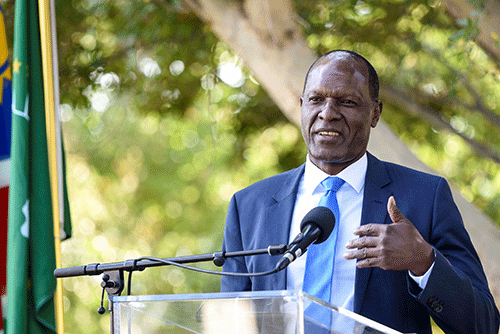Mines and energy minister Tom Alweendo this week objected to advanced economies and major global influencers, who are pressuring for Africa to stop relying on its fossil fuel resources.
Speaking at the Africa Energy Week (AEW) event happening in Cape Town, Alweendo noted a lack of concern about the negative impact Africans will face when rushing to transition from fossil fuels to more carbon-neutral renewable energies.
“What I, however, find unreasonable is when some countries and global interest groups try to dissuade Africa from leveraging some of its natural resources. They suggest, and at times demand, that Africa give up its fossil fuel energy sources. They coax us to, as soon as possible, switch to clean renewable energy sources, such as wind and solar.
This urging is akin to the proverbial ‘kicking away the ladder’,” said Alweendo.
The minister explained he is not challenging the fact that climate change is real and concerns everyone.
He noted that the impact of climate change can be observed across Africa in the form of devastating droughts and floods in various countries.
He further noted that most African countries experienced changed rainfall patterns, which negatively affected continental food security.
“Think about the potential loss of economic opportunities and greater difficulties in delivering reliable electricity to the hundreds of millions of Africans who need it so badly. Think about the ensuing loss of the livelihoods that most African countries have been carefully nurturing over the last few decades,” Alweendo maintained.
He also told the gathering that pushing Africa to move forward with a rushed energy transition on any timetable other than its own is yet another example of the lack of appreciation the global community has for African priorities.
While there is recognition of the inevitability of an energy transition, Alweendo called for a transition that is just and equitable among nations.
He also told the AEW gathering that those countries who polluted the most should decarbonise the most – and that they should do so fast.
Also attending AEW, President Hage Geingob informed participants that Namibia has witnessed more than 36 wells being drilled since 1974 – and today the country is clearly at the cusp of birthing a globally significant hydrocarbon industry.
Geingob said recent oil and gas discoveries are opportunities that are impossible to pass up.
In 2022, Shell and Total announced major oil discoveries offshore Namibia in the Orange basin that if diligently developed, could produce light crude oil reserves, estimated at 3 billion barrels.
Hydrogen ambitions
As part of the drive to decarbonise its European refineries, Total Energies recently issued a call for tenders for the supply of 500 000 tonnes per year of green hydrogen. In 2022, Shell announced its final investment decision to build Europe’s largest renewable hydrogen plant, which is expected to produce up to 60 000 kilogrammes of renewable hydrogen per day and will be operational in 2025.
“The question is, is it contradictory for Namibia to advocate for the exploration of hydrocarbons on its shores while also pursuing a burgeoning green and blue economy? In my view, the answer is a resounding no! Not only can the two co-exist, but indeed they are wholly interdependent and complimentary,” said Geingob.
Hydrocarbons continue to power the global economic engine, with the just energy transition expected to take several decades before many nations achieve carbon neutrality.
Last month, Geingob noted that about 10 years ago at the Paris Climate Summit in 2015, there were promises made by developed nations regarding climate change.
However, he emphasised that none of these promises have yet materialised.
“We are promised they are going to do something, but nothing comes out of it. Some are emitting these damaging things. They are supposed to stand up, and they are rich countries, but they’re not doing that. They should correct the mistakes they’ve made. It is a bad thing,” Geingob said during a technical stopover in France while delivering a lecture about climate change and global governance.
Furthermore, AFP recently reported that European Union member states› common position adopted unanimously late Monday to seek a global phase-out of fossil fuels and for their use to reach a peak during this decade.
At the upcoming COP28 UN climate talks, scheduled for November, the EU will also call for eliminating “as soon as possible” subsidies for fossil fuels that do not serve to combat energy poverty or ensure a “just transition” but without setting a deadline as non-governmental organisations had hoped.
“(The European) Council stresses that the transition to a climate-neutral economy will require a global phase-out of unabated fossil fuels and a peak in their consumption in this decade,” reads a statement released after the meeting of EU environment ministers.



